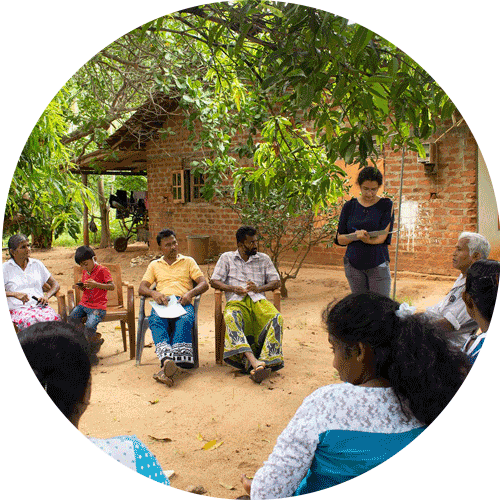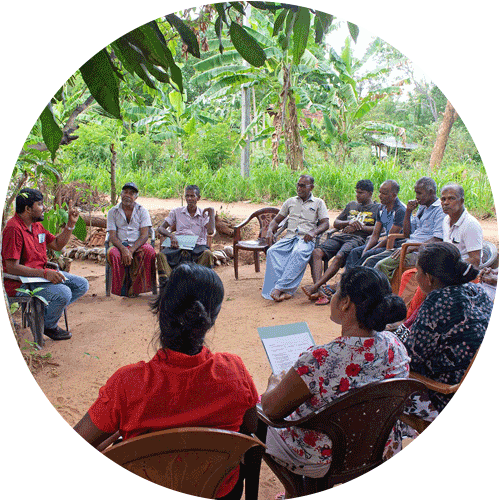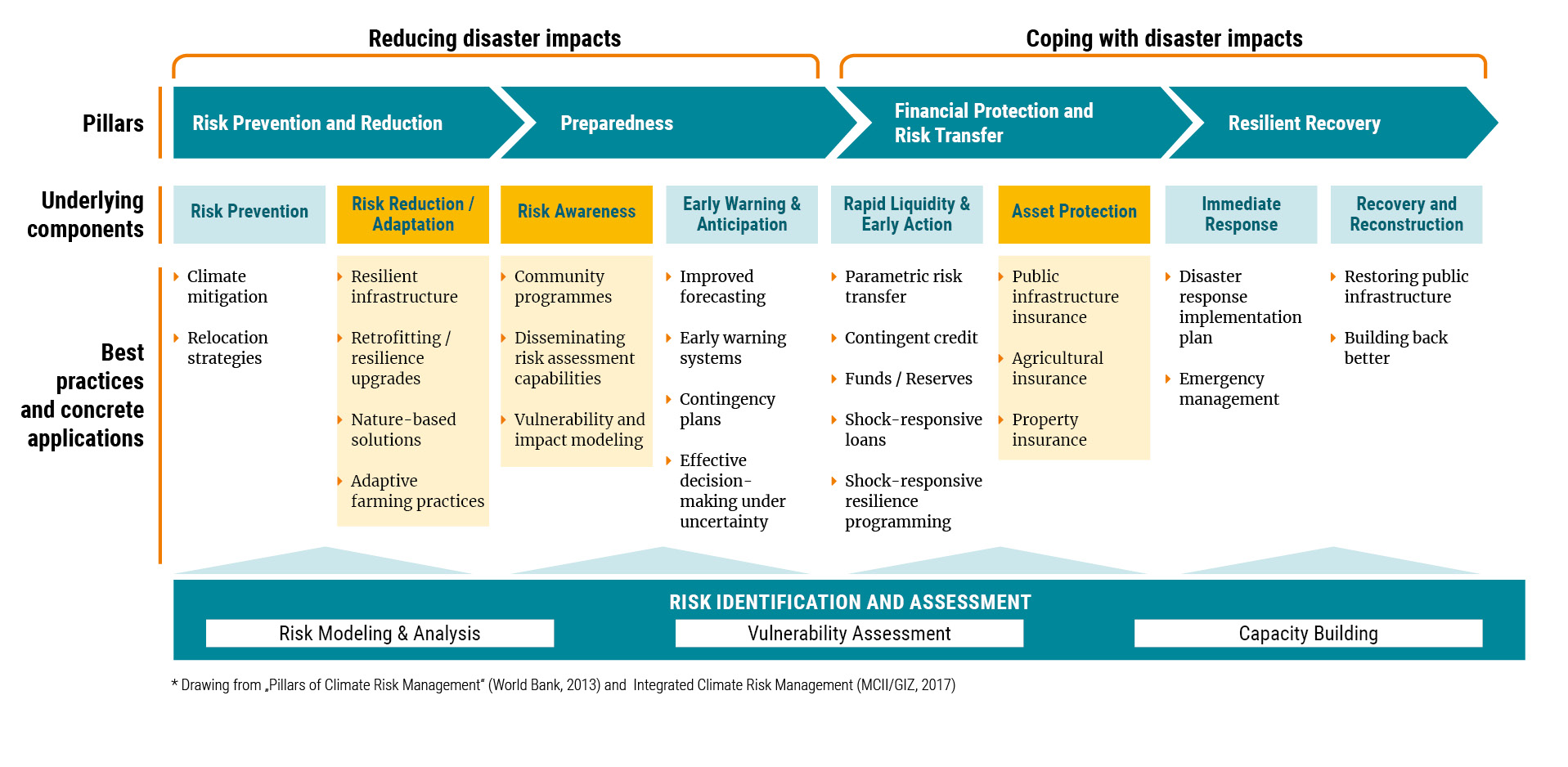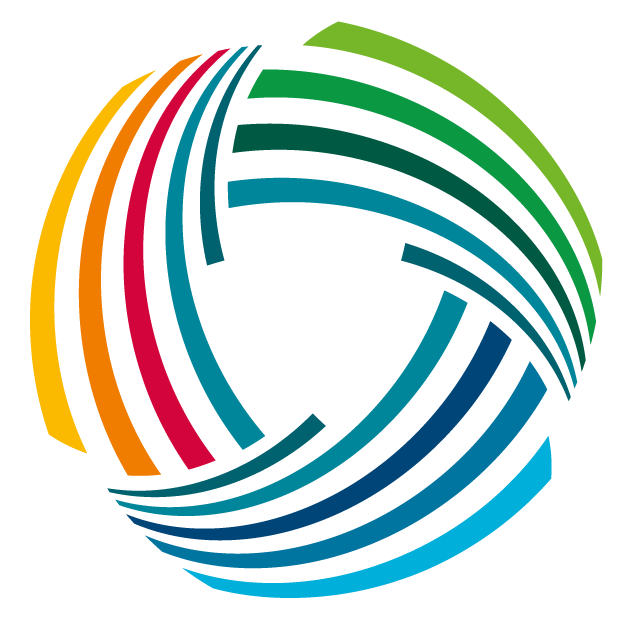Workstream 2: Action & Implementation
Enable effective action and implementation of high-quality Climate and Disaster Risk Finance and Insurance solutions in poor and vulnerable countries
SLYCAN Trust - Addressing Climate Risk to Agricultural Communities in Sri Lanka: Stakeholder Engagement and Multi-Actor Partnerships
By the SLYCAN Trust
Sri Lanka’s agriculture sector is vulnerable to the impacts of climate change, including temperature increase, droughts, floods and water scarcity. In order to understand and address these climate risks, SLYCAN Trust has conducted several activities at national and local level with the aim of creating a comprehensive map of stakeholders and identified crucial needs and entry points for improving Climate and Disaster Risk Finance and Insurance (CDRFI) through its project work with Multi-Actor Partnerships on Climate and Disaster Risk Financing and Preparedness in the Context of the InsuResilience Global Partnership (MAPs) and other related projects. By connecting with a broad range of stakeholders, SLYCAN Trust aims to form lasting multi-actor partnerships to strengthen links and synergies that can enhance CDRFI in Sri Lanka and empower smallholder farmers.
Country Background
Sri Lanka faces severe climate risks, in particular to its rural agriculture sector. Over the past decades, the agriculture sector has experienced a range of climate-change impacts, including increasing air temperatures, erratic rainfall patterns, and more frequent and intense extreme weather events. Heat stress, pests and diseases, water scarcity, saline intrusion, increased evapotranspiration, invasive species and soil degradation continue to cause declines in agricultural productivity, yield and income.
Millions of families depend on smallholder crop cultivation, livestock and fisheries for food security and livelihoods. In their farming operations, they are exposed to compound risks from climate hazards, market uncertainties and the Covid-19 pandemic that threaten to reverse development progress and push them into poverty.
Sri Lanka introduced agricultural insurance schemes as early as 1958 to ensure resilience in the agriculture sector and it has been running public risk-transfer mechanisms ever since. The country has also included risk management and enhancing resilience in its climate-related commitments and plans, including the Nationally Determined Contributions. However, there remains space for enhancing the existing risk-management mechanisms by strengthening institutional coordination and technical capacity on CDRFI.
In-depth interviews with farmers conducted in Anuradhapura and Trincomalee district, Sri Lanka
Project description
As part of the MAPs global project on establishing multi-stakeholder partnerships related to CDRFI in the context of the InsuResilience Global Partnership and through other related projects, SLYCAN Trust is working in Sri Lanka’s agriculture sector.
The envisaged impact of the MAPS project is to reduce the negative consequences of disasters and climate change on the development opportunities and living conditions of particularly vulnerable population groups such as farmers in selected developing countries through effective, poverty-oriented and equitable implementation of measures to finance resilience-building through climate and disaster risk finance and transfer. The main outcomes and outputs pursued by the project are the establishment and expansion of multi-actor dialogue platforms at national and global level. SLYCAN Trust aims to establish a solid foundation of knowledge and evidence to identify key stakeholders, vulnerabilities of farming communities and opportunities for improving national CDRFI mechanisms, recognizing that the agriculture sector comprises complex supply and value chains as well as support systems including extension services, weather information providers, financial institutions, insurers, telecommunication companies and government agencies.
Building on this research, SLYCAN Trust works towards connecting different stakeholder groups and establishing avenues of communication and cooperation between them. This leads to enhanced coordination and a higher level of effectiveness for existing CDRFI mechanisms. By identifying entry points for different stakeholders and providing evidence-based recommendations for better integration of CDRFI into policies, plans and processes, the research is working towards achieving the overall goals of the MAPS project.


“I am 62 years old and have been farming for 40 years, but I have never come across such an informative programme for farmers. I highly appreciate the knowledge provided about the importance of local organic farming and agricultural insurance. We hope that you will all continue to support us and take this programme forward.”
Testimony from smallholder farmers at group meetings held on 17 and 18 September 2020 in the Anuradhapura and Trincomalee districts, Sri Lanka

Project description (continued)
- Mapping stakeholders, their mandates, responsibilities and relationships
- Understanding climate and disaster risk and entry points for improving CDRFI
- Connecting with stakeholders at the national level and on the ground
- Integrating CDRFI-related elements and aspects into national and local policies, plans and strategies, including NDCs and localizing the UN Sustainable Development Goals


“Through this session today, we had the opportunity to discuss the problems faced by farmers and issues with various crops. I think it was very useful for all participants to exchange ideas with each other and to gain knowledge about agricultural insurance.”
Testimony from smallholder farmers at group meetings held on 17 and 18 September 2020 in the Anuradhapura and Trincomalee districts, Sri Lanka

Covid-19 impact and response
Research activities and consultative processes focusing on CDRFI have been impacted by the outbreak of Covid-19 in Sri Lanka and strict mitigation measures, including a nationwide curfew. This has reduced the number of interviews and consultations at local level with farmers, women and youth. It was necessary to adapt the research and consultation activities to Covid-19-related health guidelines and regulations.
Farmers in the project areas have also been impacted as a result of Covid-19. Farmers who would usually travel outside their village in search of employment between harvest seasons have been restricted in their movements as a result of curfews. Furthermore, those who engaged in other secondary income-generating ventures including running grocery stores or eateries have also been impacted by restrictions in cashflow.
Nevertheless, several national workshops and expert consultations were converted to a virtual format and in some cases to in-person events with social distancing to sustain stakeholder engagement. Another measure used was key government institutions joining as groups from their premises to participate in the virtual events. Once the curfew was lifted and regulations permitted, field work was resumed with comprehensive safety precautions, such as face masks, hand disinfection and social distancing. Despite the impact of Covid-19, SLYCAN Trust has strived to continue activities related to CDRFI and tried to identify avenues to address risks related to Covid-19.
InsuResilience MAPs - Multi-actor-partnership on Climate and Disaster Risk Finance in the context of the InsuResilience Global Partnership
Funded by the German Ministry for Economic Cooperation and Development (BMZ), a consortium of civil society organisations is implementing the project titled “Multi-actor-partnership on Climate and Disaster Risk Finance in the context of the InsuResilience Global Partnership”. In addition to global-level influencing work, the core of the project will be national-level engagement, capacity development and the establishment of multi-actor partnerships on climate risk finance. The countries are Laos, Sri Lanka, Malawi, Madagascar, Senegal, Philippines, Caribbean. The project is being implemented between November 2019 and April 2022 by a consortium of CARE Germany, Germanwatch, the Munich Climate Insurance Initiative (MCII), the Caribbean Centre for Policy Development (CPDC), Community Development and Environment Association (CDEA), CARE International in Laos, SAF-FKJM, CARE International in Madagascar, Civil Society Network on Climate Change (CISONECC), CARE International in Malawi, Institute for Climate and Sustainable Cities (ICSC), ENDA Energy Environment Development, Chrysalis and SLYCAN Trust.
Summary Table
Overview | |
|---|---|
Risk(s) to be covered | Climate risks to the agriculture sector, especially those related to drought, water scarcity and temperature increase, as well as non-climate risks compounding climate impacts |
Product/Solution | Multi-actor partnerships for CDRFI in Sri Lanka |
Objective | Building a comprehensive foundation of knowledge and evidence to understand the climate risks facing Sri Lanka’s agriculture sector. Mapping stakeholders, their mandates, responsibilities and relationships as well as connecting them at the national and local level to create stronger links and synergies that facilitate enhanced CDRFI in Sri Lanka. Facilitating stronger integration of CDRFI-related elements and aspects into national and local-level policies, plans and strategies, including NDCs and localizing SDGs. |
Beneficiaries | Smallholder farmers and their families nationwide and especially in the districts of Anuradhapura and Trincomalee; relevant government institutions, private sector including insurance companies and financial institutions, civil society and other stakeholders working on climate risk management and risk transfer in the agriculture sector |
InsuResilience Global Partnership Members and their partner organizations/governments | SLYCAN Trust implements activities as part of the InsuResilience MAPs project and other thematically related projects.
CARE Germany as global lead for the InsuResilience MAPs project in collaboration with MCII, Germanwatch and country partners, including Chrysalis for the thematic areas of plantations and SMEs in Sri Lanka
Humane Society International as partner for projects related to thematic areas on sustainable food systems and ecosystem conservation
|
Climate and Disaster Risk Management
Placement of this project along the climate and disaster risk continuum:

